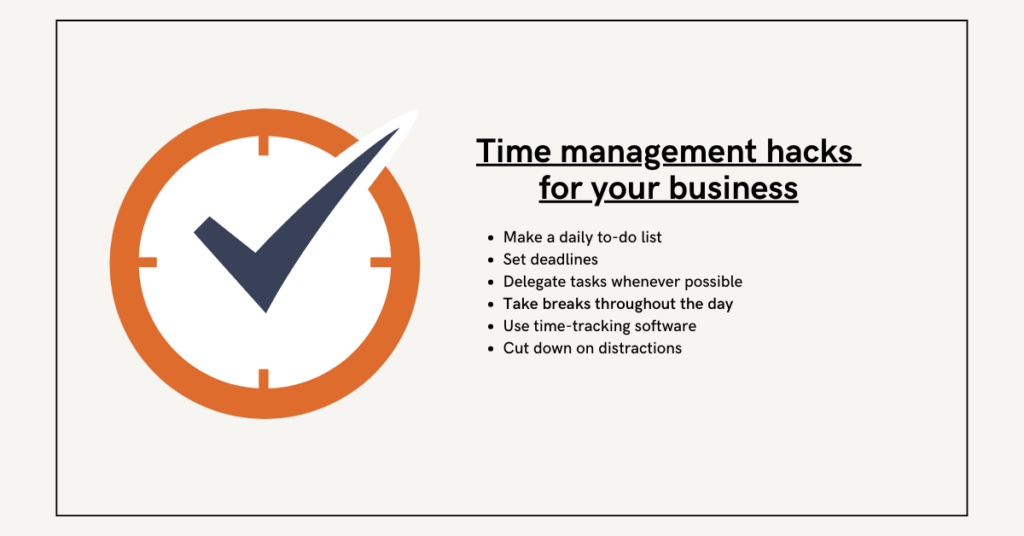The Importance of Employee Time Management for your Business in 2025

Employee productivity can be extremely high with employee time management.
When employees have the tools and skills to do their job, they have everything they need to succeed. With employee time management, employees will know what is expected of them and how long each task should take them to complete.
Successful time management is crucial for being organized and efficient in the office. It can also help with conflict resolution as employees will be on the same page about their responsibilities and deadlines.
Productivity and employee time management

Productivity and employee time management naturally go together. Ensuring employee time management will increase overall productivity, significantly benefiting the business.
Employee satisfaction is extremely important to just about every type of business, and having employee time management can help immensely with employee satisfaction. For example, if employees know exactly what is expected of them and how long it should take to complete each task, they feel progressing throughout their workday.
The employee feels as though they are making a difference for the company rather than wasting their day not knowing what needs to be done next or feeling they are spinning their wheels, unable to make any real progress.
— Crystal P. (@crystalp)
Time management hacks for your business

How do you manage your time? Many people feel like they don’t have enough time in the day to get everything done. This is especially true for business owners juggling a million different things. Here are some tips and tricks on better managing all this wasted time so you can focus on what’s important.
Make a daily to-do list
Write down everything you need to get done for the day and check it off as you accomplish each item. It will keep you focused on what needs to be done next and increase your chance of success.
Set deadlines
It’s great to check things off of your daily to-do list, but it’s important to achieve those milestones within a certain amount of time as well. Setting deadlines for yourself will help you prioritize your day and make sure you’re meeting them.
Delegate tasks whenever possible
If you’re constantly doing all of the work for your business, it’s time to hire some help. Delegating tasks to someone else should be done with caution and care. You want to ensure that whoever is handling these tasks has everything they need to succeed, but knowing how much time each task should take will make the planning process smoother.
Take breaks throughout the day.
Whether it’s getting up to stretch your legs, checking email, or grabbing some coffee, taking small breaks throughout your day will keep you focused and energized. Don’t be afraid to get up from your desk for even an hour – it’ll be good for you.
Use time-tracking software
Instead of guessing how long each task takes you to complete, use time-tracking software that can accurately estimate how much time is needed for certain projects. It’s also helpful to bill clients based on the tracking tool’s amount of time working for them.
Time-tracking software can help you determine exactly how long each task should take and make sure you meet all of your deadlines. You’ll focus on more important tasks, shifting smoothly from one task to another and accomplishing what needs to get done each day of the week.
Cut down on distractions
Distractions are everywhere. There’s just no getting away from them. However, you can minimize distractions by removing technology that takes your attention away from what you need to get done.
You can also do things like turn off your phone calls notifications while you’re working on a project. The more you can minimize distractions, the better you’ll be able to maintain a work-life balance.
Benefits of time management in the workplace
Time management is crucial in the business world. Managing your time efficiently will improve productivity and become a better employee. There are many benefits of good time management, and employees should recognize them and learn how to incorporate them into their daily lives.
— Malayaka (@malayakarael)
Time management improves productivity
The most important benefit that comes with effective time management is increased productivity. If you have quality control over how long it takes to complete tasks, your work efficiency could increase by as much as 20%.
With more efficient workers come higher production levels, which means more satisfied customers or clients, not to mention higher profits for the company.
The formula here is simple: if your company hires more efficient employees, they will get twice as much work done, which will help the business grow and make a name for itself in the market.
Time management helps save money
In addition to helping you save time, good time management can also save you more money. If you’re able to get work over with quickly, you won’t have to spend time sitting at your desk or doing menial tasks. Allowing workers more free time means they will be less stressed and, therefore, less likely to quit their jobs or start looking for different ones that pay better than yours.
The longer one stays in a job, the more productive he becomes, not only because he learns the ropes but also because he has less free time to spend on distractions such as searching for a new job.
Time management improves happiness
Time management can also help improve employee happiness. When employees have a good sense of time, they are less likely to feel overwhelmed and stressed. This means that they will be in a better mood, which will lead to better work performance and fewer sick days.
Increased productivity and a less stressful environment are two key ingredients for a happy and successful workplace.
Better relationships with co-workers
When working together in a company, your colleagues need to know when they can count on you and how much work is reasonable for you to do within a given timeframe. Because time management allows workers to organize themselves better, it makes it easier for everyone to collaborate and interact without feeling stressed out and overwhelmed by what needs to be done.
If someone knows exactly what’s expected of them and how long something takes, they’ll also be able to adapt accordingly if their colleague or boss asks them to do something extra. Communication efficiently among team members is crucial in an office environment.
You will be more respected by your peers
When you manage your time well, you will be respected by others. This is because you can finish important tasks on time and give them the feedback they need. They will be impressed by your level of professionalism and competence.
Everyone wants to work with people who can get the job done and respect their time. By managing your time perfectly, you’ll stand out among your peers and become a better leader in the process.
Maximize productivity of your business
Track employee productivity and simplify work with them
How to develop time management skills for your team?
When workers are productive and efficient, the company benefits from increased profits and a good reputation. However, to increase productivity and efficiency within your team, you have to invest in their time management skills.
Workers need to know when they are expected to complete certain tasks and how long each project takes. They need to plan their time well so that they can do everything without feeling rushed or stressed.
— arliii (@ArliNatalie__)
Here are some helpful tips for developing your team’s time management skills:
Start by setting expectations
Everyone on your team should be aware of the business goals you’re trying to achieve and the deadlines you’re working towards. When you’re clear about your expectations, it’s much easier to tell whether or not things are being done promptly.
Explain why time management is an important task
It’s not always easy for busy workers to understand the importance of doing certain tasks within a specific period. Sometimes, they may feel like they’ve gotten everything done, even if it was completed at the last minute. That is why they need to know that there is a purpose behind your urgency, and it matters.
Tell your team why you need them to work on time and how their time management skills will benefit the company.
Set a good example
Don’t expect your employees to work any faster than you do. If you’re always running late, it’s doubtful that anybody will be able to finish their work differently.
Set a good example by carefully planning your tasks and sticking to your schedule as much as possible, even if you’re the busiest person on the team. When you set a good example for your employees, they might start to follow your lead.
Reward your team’s time management efforts
If you’re working towards a big deadline and your employees can see that you’re doing everything possible to meet it, then they’ll be motivated to work harder as well. Make sure that your team members know you value their efforts by giving incentives for excellent time management.
As an employer, you’ll certainly see the benefits of having employees who work faster and more efficiently. But working with your team to improve their time management skills will also benefit them.
Teach your team to plan and estimate their time better
If you want your employees to be more productive, they need to know how much time something will take them. If there’s a task that needs to get done and it shouldn’t take very long, let your team members know about their remaining schedule to figure out whether or not they have enough time to finish what they started. If you’re able to teach your employees the basics of time management, they’ll be able to plan their days much more efficiently.
You can also train them to put everything in perspective by estimating how long certain tasks can take and coming up with workarounds for problems that might arise while working on something.
Meet with your team members regularly
When you meet with your employees, you can see whether or not they’re working to the best of their abilities. It’s also a good idea to set goals to know exactly what is expected of them during their workday. Meet with your team members regularly to see how they’re improving their time management skills.
Ask your employees about their time management skills
You can’t expect your team members always to know whether or not they’re working on the right things, especially if they’re new to their jobs. You should ask your employees how they are feeling and if there is anything you can do to help them improve their performance.
A little bit of communication can go a long way, especially when helping your team understand the importance of managing their time well.
Help your employees prioritize
One of the best ways to improve your team’s time management skills is to help them prioritize their tasks. This means teaching them to figure out which tasks are the most important and must be completed first.
You can start by setting up a system where your employees rank their tasks in order of importance. This will help them understand which tasks are more important and need to be taken first. If they can complete their most important tasks on time, they’ll feel more accomplished and be less stressed out.
Another way to help your employees prioritize is by giving them a specific timeframe for completing each task. This will teach them how to work under pressure and figure out how much time they need to complete a certain task.
Give your staff time management training
Time management training is essential for any business. Employees who use time management skills can be more productive and efficient, which leads to better results for the company. Time management training can also help to improve communication within a team and help employees better manage their time.
Managers should provide time management training to improve the performance of their employees. More productive employees will complete more work within a regular working day. This means that they will need fewer late nights and early starts. This can allow employees to live outside of work instead of spending most of their free time working.
Many people find it challenging to manage their time effectively. If employees are not taught how to use their time effectively, they can have no work-life balance. It is also difficult to accomplish everything you need to do, leading to stress and an unhappy lifestyle.
Training can also help employees better communicate with other team members, which is beneficial for any business. Time management training can explain how people work and when they prefer to start or finish during working hours.
Everyone in the company should have access to time management training. Giving out information to everyone will increase productivity motivation and give employees a sense of teamwork.
There are also many time management training courses that can be done online and in the classroom. If the training is done in a group, it can be more fun, and employees will learn faster when they are learning together.
Some employees may also lack the motivation to improve their time management. Still, if they see that it is regularly addressed at work, they will become more aware of the importance and benefits of having a good routine.
Encourage employees to create a time management calendar
A time management calendar is a good way for employees to see what tasks are coming up in the next few days. Allocating enough time for certain actions can help improve productivity. The team will focus on too many tasks without worrying about forgetting them.
Create a time management calendar that is easy to understand and follow. This should include quick-reference boxes or notes for each day of the week so that employees can check what each task requires before beginning it.
You could also consider creating separate timesheets for work, home, and social activities – this will help employees better manage their time outside of billable hours.
Encouraging your employees to create a calendar will help them understand their available time to do certain tasks. If a task requires an hour or two outside of the usual work hours, it will be scheduled for that time.
Suppose you make these timesheets readily available for any staff member to access at all times. In that case, it can also promote teamwork and allow managers to see what their employees are up to during unpaid hours.
Help employees discover where their time is going with a time audit
Time audits are a great way to understand the time spent on tasks and discover the wasted time. When employees understand where their time is going, they can make adjustments to improve productivity, never miss deadlines, and increase engagement with their projects.
Remove any unnecessary steps from workflows so employees can spend more of their hours on activities that contribute directly to achieving company goals.
Once the biggest drains have been addressed, it will be easier to see necessary improvements. This approach changes more effectively than just telling employees what needs improving then leaving them to their own devices.
Time audits can be eye-opening for employees who have little idea how much time they spend on activities that don’t contribute directly to achieving company goals.
After being shown the procedure, it doesn’t require too many meetings to figure out where their time is going. They can see where they might save time and apply those changes immediately.
Conclusion: The Key to Building a Productive and Successful Business
Time management is key to a productive and successful business. Poor time management can lead to employee burnout, decreased productivity, and even loss of customers. However, with the right tools and training, employees can learn to manage their time more efficiently and improve their work performance.
Employers should promote the use of time management calendars and provide training on keeping track of work hours, activities outside of billable hours, and availability.
Time audits, and training sessions can help employees discover where their time goes and make changes to improve productivity.
Finally, managers should recognize and reward employees for a job well done to motivate even better performance. Once employees understand how time management affects their projects and work environment, they can make the necessary changes to manage their time better and contribute to the company’s success.
– The Monitask Team
Frequently Asked Questions
Why is time management necessary for every employee?
Time management is important to every employee because it allows them to focus on their work and not worry about fitting everything in.
When employees manage their time well, they can be more productive and less stressed. This can lead to a more positive work environment and improved employee morale.
Additionally, good time management skills can help employees meet deadlines and stay on track with their projects.



